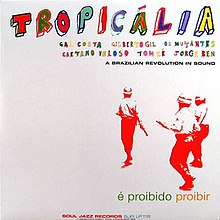Tropicália: A Brazilian Revolution in Sound is a 2006 compilation album released by Soul Jazz Records.
| Tropicália: A Brazilian Revolution in Sound | |
|---|---|
 | |
| Compilation album by Various Artists | |
| Released | February 13, 2006 |
| Genre | Tropicália |
| Language | Portuguese |
| Label | Soul Jazz |
| Compiler | Stuart Baker |
Release
editTropicália: A Brazilian Revolution in Sound was initially set for release in 2005, the album was pushed to February 13, 2006 to tie in with a Tropicalia festival at the Barbican in London.[1][2] The festival had nearly every artist featured on the compilation.[1] The album was re-released in 2010.[1][3]
Reception
edit| Aggregate scores | |
|---|---|
| Source | Rating |
| Metacritic | 93/100[4] |
| Review scores | |
| Source | Rating |
| Robert Christgau | A−[5] |
| Entertainment Weekly | A[6] |
| The Guardian | [7] |
| Pitchfork Media | (9.5/10)[8] |
| The Province | A[9] |
At Metacritic, which assigns a normalised rating out of 100 to reviews from mainstream critics, the album has received an average score of 93, indicating universal acclaim, based on 10 reviews.[4] Richard Williams of The Guardian" commented that the artists on the album "brim with youthful inventiveness, blending funk grooves, Brazilian energy, a restrained hint of primitive Haight-Ashbury psychedelics, a sense of humour that transcends linguistic boundaries and a Beatlesque sense of limitless possibilities expressed in the use of orchestral resources alongside the usual beat-group or samba-combo instrumentation." that were "Wildly original, often leaping off in several directions at once, veering at will from a kind of beach-party jug band to a warped version of the soft rock of the Mamas and the Papas or the Fifth Dimension, they make you want to go straight out and buy everything this amazing group ever recorded."[7] Joe Tangari declared that the compilation takes "an extremely focused look at six of the most important and influential Tropicália artists, [...] responsible for some of the most bracing records Brazil ever produced-- and though omissions are certain to be an issue for cratedigging obsessives, this collection is as flawless a primer as has ever been made available on a single disc."[8]
Track listing
editTrack listing adapted from the liner notes.[10]
| No. | Title | Writer(s) | Credited Performer | Length |
|---|---|---|---|---|
| 1. | "Bat Macumba" | Caetano Veloso, Gilberto Gil | Gilberto Gil | |
| 2. | "A Minha Menina" | Jorge Ben | Os Mutantes | |
| 3. | "Tuareg" | Ben | Gal Costa | |
| 4. | "Domingo No Parque" | Gil | Gilberto Gil & Os Mutantes | |
| 5. | "Alfômega" | Gil | Caetano Veloso | |
| 6. | "Sebastiana" | Gal Costa | ||
| 7. | "Procissão" | Gil | Gilberto Gil | |
| 8. | "Irene" | Veloso | Caetano Veloso | |
| 9. | "Ave Genghis Khan" | Rita Lee, Arnaldo Baptista, Sérgio Dias | Os Mutantes | |
| 10. | "Take It Easy, My Brother Charles" | Ben | Jorge Ben | |
| 11. | "Jimmy, Benda-Se" | Tom Zé, Waldez | Tom Zé | |
| 12. | "Ando Meio Desligado" | Lee, Dias, Batistsa | Os Mutantes | |
| 13. | "Tropicália" | Veloso | Caetano Veloso | |
| 14. | "Quero Sambal Meu Bes" | Tom Zé | ||
| 15. | "Vou Recomeçar" | Gal Costa | ||
| 16. | "Panis et Circenses" | Gil, Veloso | Os Mutantes | |
| 17. | "Gloria" | Tom Zé | ||
| 18. | "Quem Tem Medo De Brincar De Amor" | Baptista, Lee | Os Mutnates | |
| 19. | "Lost in the Paradise" | Veloso | Caetano Veloso | |
| 20. | "Bat Macumba" | Veloso, Gil | Os Mutantes |
Credits
editCredits adapted from the vinyl liner notes.[10]
- Stuart Baker – compiler, sleeve notes
- Adrian Self – sleeve designer
- Toothé Grim – sleeve designer
- Pete Reilly – mastering
- Duncan Cowell – mastering
References
editFootnotes
edit- ^ a b c "December News". Soul Jazz Records. December 2005. Archived from the original on January 14, 2006. Retrieved August 29, 2020.
- ^ "January News". Soul Jazz Records. December 2005. Archived from the original on January 18, 2006. Retrieved August 29, 2020.
- ^ "Soul Jazz's Tropicália compilation: 2010 edition". Fact. April 8, 2010. Retrieved August 29, 2020.
- ^ a b "Tropicalia: A Brazilian Revolution in Sound". Metacritic. Retrieved August 29, 2020.
- ^ Christgau, Robert (2006). "Consumer Guide Album". Robertchristgau.com. Retrieved September 1, 2020.
- ^ Endelman 2006.
- ^ a b Williams 2006.
- ^ a b Tangari 2006.
- ^ Derdeyn 2006.
- ^ a b Baker 2005.
Sources
edit- Baker, Stuart (2005). Tropicália: A Brazilian Revolution in Sound (Media notes). Soul Jazz Records. SJR LP 118.
- Derdeyn, Stuart (January 17, 2006). "Brazilian". The Province. p. B9.
- Endelman, Michael (January 23, 2006). "Tropicalia". Entertainment Weekly. Archived from the original on October 22, 2015. Retrieved August 29, 2020.
- Tangari, Joe (January 31, 2006). "Tropicália: A Brazilian Revolution in Sound". Pitchfork. Retrieved August 29, 2020.
- Williams, Richard (February 9, 2006). "Gilberto Gil, Caetano Veloso, Gal Costa, Jorge Ben, Os Mutantes and Tom Ze: Tropicalia/A Brazilian Revolution in Sound". The Guardian. Archived from the original on September 21, 2014. Retrieved August 29, 2020.